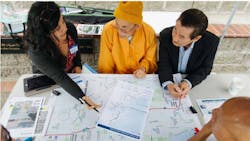Sound Transit Board approves transfer of surplus property at no cost to city of Seattle for development of affordable housing
A motion to transfer 10 surplus property sites in the Rainier Valley has been approved by the Sound Transit Board at no cost to the city of Seattle for the development of affordable housing, as a part of a partnership that includes a $10-million commitment from the city to build affordable homeownership opportunities.
"This action highlights how we are turning our effort to foster affordable housing near transit into real progress on the ground," said Sound Transit CEO Peter Rogoff. "Through this partnership with the city, affordable homes near our rail stations will help ensure that low-income households continue to have access to high-quality, dependable transit to access jobs, education and services throughout the region."
"The members of the Sound Transit Board recognize the urgency for affordable housing across the region," said Seattle Mayor and Sound Transit Board Member Jenny Durkan. "Our action will contribute to a range of housing options for Seattle families, including realizing the dream of homeownership for low- and moderate-income families. Our city and Sound Transit partnership will continue and deepen as we provide homes and safer spaces for some of the most vulnerable members of our community. Throughout this entire process, hearing and learning from South Seattle communities has been the cornerstone of developing the right approach to address the housing needs of this community and that engagement will continue."
When Sound Transit built Link light rail through the Rainier Valley, the agency purchased several small parcels of property adjacent to the line for construction purposes. The remaining parcels make up development sites that are between 2,300- and 14,000-square feet and are located within a half mile from the Othello, Columbia City and Mt. Baker Link light-rail stations.
The individual property parcels were purchased with a federal participation rate of between zero and 60 percent, and their disposition requires federal approval. In this case, the Federal Transit Administration approved a disposition method that allows Sound Transit to transfer these parcels at no cost to the City of Seattle for affordable housing without repaying the federal interest.
Under the terms of the agreement, at least 100 to 150 homes will be created across the sites. All the housing units will be sold or rented to households whose adjusted income is at or below 80 percent of the average median income.
The Office of Housing will make all 10 sites available for development by Request for Proposal within 10 years of the date of transfer, and the first three sites will be made available via Request for Proposal within approximately 180 days of transfer. In addition, the Office of Housing will make a minimum of $10 million in funding available for the development of the identified properties.
In 2019, Sound Transit and the Office of Housing contracted with Puget Sound Sage, a nonprofit organization that seeks to turn community visioning into policy through community-based participatory research, to hold six in-person community meetings with Limited English Speaking and historically underrepresented groups. In addition, Sound Transit offered an online survey, available in six languages, sent letters to neighboring properties, posted signage and staffed community fairs and festivals. In total, nearly 1,500 people received letters; nearly 1,000 took the survey; more than 200 spoke with Sound Transit representatives at community events and the agency met directly with more than 100 community members.
Feedback received through this process overwhelmingly supported affordable homeownership outcomes on all the proposed sites in this action. In the upcoming months, Seattle Office of Housing will be engaging national organization Grounded Solutions Network and local organization Puget Sound Sage to conduct a broad community visioning process to shape the outcomes across the 10 sites.
